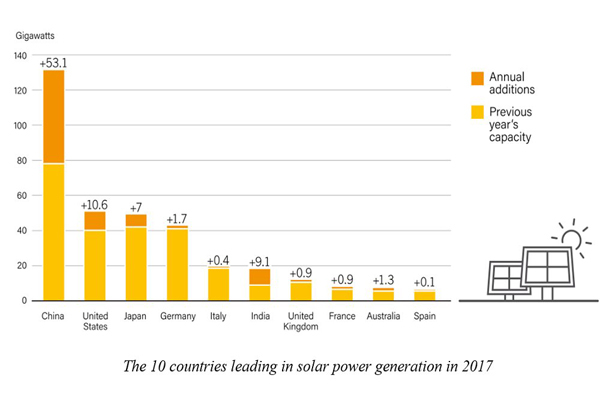 |
Coal-fired power is no longer a priority in the development strategy due to its impact on the environment. The production of nuclear power has been ceased, while there remains limited room for hydropower development. In addition, liquefied natural gas-fired thermal power needs a long time to be developed.
In this situation, the development of renewable energy, such as wind and solar power, is indispensable to make the world a safer and better place for people.
Chosen by destiny
From 2018 to June 2019, the Government approved more than 330 solar power projects, including 121 projects with a total capacity of 6,100 megawatts by 2020 and 7,200 megawatts by 2030. Moreover, 221 other projects with a combined registered capacity of over 14,330 megawatts are waiting for the competent agencies’ approval.
According to statistics from the Ministry of Industry and Trade, as of September 2020, the total capacity of renewable energy resources, including solar, wind and biomass energy, had amounted to 5.5 gigawatts
Dao Minh Hien, MS, director of the Research and Development Center at Power Engineering Consulting Joint Stock Company 2, said solar power projects can be put into commercial operation for 25 years on average, even longer, depending on the approach taken by enterprises. Only after the next 20-30 years should Vietnam need to work out solutions to deal with expired solar panels.
The development of energy globally has changed over periods. From today, people must understand facts about solar panels to prevent a misunderstanding that out-of-date solar panels may become hazardous waste. They are a scientific and technical achievement of mankind.
 |
| A typical solar farm in association with ecotourism in the region. |
According to SolarTech, a provider of solar power solutions from the United States, photovoltaic solar panels have a long lifespan of 20-30 years. Some solar panels produced in the 1970s and 1980s have still been in good conditions.
Many agencies in the United States have conducted experiments to test the impact of solar panels on the environment and they have not considered photovoltaic solar panel products as hazardous waste.
SolarTech also informed that in the United States, instead of being considered as hazardous waste, unused solar panels (as they are out of date or degrade) are the input material for the production of new solar panels or for other purposes that are friendly to the environment. All materials used to produce solar panels will be collected and reused.
Specifically, in a solar panel, the tempered glass is the heaviest, accounting for 65% of the weight of a solar panel, followed by the frame, making up 20%; and photoelectric cells, some 6%-8%.
The glass, the frame and photoelectric cells account for some 91%-93% of the weight of a solar panel. Thus, most components of solar panels can be recycled.
 |
| The Sao Mai solar power tourist site. |
The International Renewable Energy Agency was established in 2009 to encourage the use of renewable energy in any form. The agency has estimated that two billion new solar panels will be produced from these reused components by 2050.
This means that 630 gigawatts of clean energy will be generated thanks to recycled materials. In addition, plants recycling solar panels will offer more jobs for laborers. A research on the recycling of solar panels shows that these components may be valued at US$450 million by 2030 and more than US$15 billion by 2050.
At present, many plants recycling old solar panels have reached a recycling rate of 96%.
According to Veolia Group, which has contributed to climate change mitigation, natural resource protection and ecosystem conservation, it can recycle 40 tons of solar panels per year. If a ton of solar panels is recycled, 1.2 tons of carbon dioxide will not be released into the environment. Its new factory in Rousset in southern France is expected to recycle 4,000 tons of solar panels by 2022.
This is a new and optimistic signal for investors of renewable energy projects. SGT

Facts about renewable energy
At present, renewable energy plays an important role in meeting people’s increasing demand for energy. Renewable energy resources are abundant and available in the nature and exist in many forms.

Vietnam’s renewables: Advantages and considerations
Input costs for both solar and wind power in Vietnam fell respective 75% and 30% in 2012-2017.